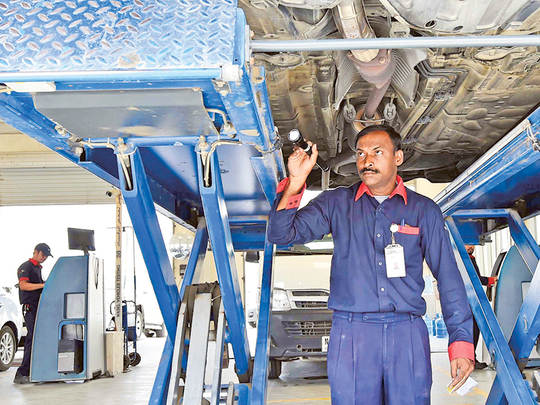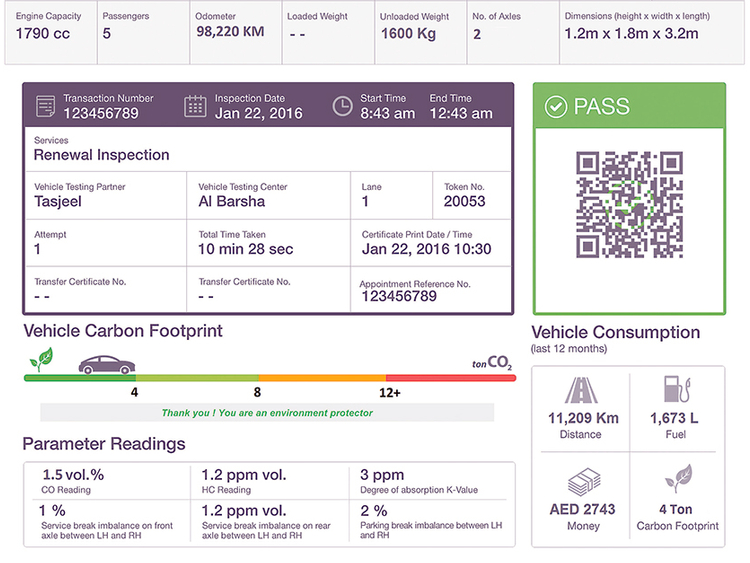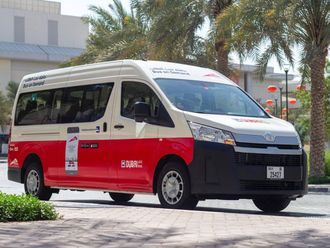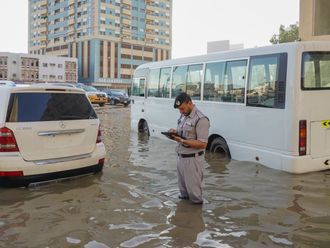
Dubai: Annual roadworthiness tests that are mandatory for all vehicles over three years old will show the carbon footprint of the vehicle from next month, Gulf News can confirm.
The Roads and Transport Authority (RTA) has introduced an automated system that will rate vehicles according to their CO2 emission levels while also showing the vehicle’s cost effectiveness in the annual test report.
As part of the system, which is a first in the region, the annual test reports will also show the distance clocked by the vehicle and the volume of fuel used in a year.
“We will be recording the vehicle’s mileage at each renewal and based on that we can calculate the distance clocked by the vehicle during the past 12 months. The mileage, combined with the engine capacity of the vehicle, the number of cylinders, weight of the car and other features will be used to calculate the eco-friendliness of the vehicle,” said Ahmad Hashem Behroozian, CEO of RTA’s Licensing Agency.
The mechanism will have all vehicles divided into four categories, with those with a carbon footprint rating of four considered the most eco-friendly.
Other categories include vehicles with ratings between four and eight, which is considered good, while those rated between eight and 12 are average and vehicles with a 12 plus rating of carbon footprint are considered the worst.
Though the emissions rating may not immediately impact the result of the vehicle tests, the data accumulated will be used to formulate new environmental policies.
Behroozian said that the system will help the government avail of accurate vehicle emissions information that will support the building of environmental impact reports.
“This will enable the government to take corrective environmental action, while also increasing the awareness of the public on the harmful effects of emissions generated by their vehicle through the annual vehicle test certificate,” said Behroozian.
He added that the idea of the initiative is to show people the impact their vehicles have on the environment as the report will also show the environmental cost of the vehicle, valued in dirhams.
“It will create awareness among the people about the positive or negative impact their vehicles are having on the environment. It is a way of advising people as to where they stand in terms of their carbon footprint on the road. We are trying to link the ownership of vehicle to responsibility in protecting the environment,” said Behroozian.
Green initiatives
He added that RTA’s Licensing Agency is taking several other steps to reduce vehicle emission levels in the city, including restriction of a number of services to online channels.
“Each transaction performed online or via smart apps reduces carbon emissions on average by 10kg. And, through this approach. RTA contributes in reduction of carbon dioxide emissions by 1,243,480kg a month,” said Behroozian.
He urged motorists to limit their trips as much as they can, using online services rather than visiting customer care centres.
More than 160 RTA services are currently available online, including vehicle registration and driving licence renewal.
He said RTA is close to achieving its targets of saving 2.8 million sheets of paper, 350 trees, 39 million kilometres of driving distance, 6 million litres of fuel and 14 million kilograms of CO2 emissions this year.
“Some of the steps taken to achieve these targets include using clean fuel in drivers’ training institutes, recycling discarded alumiium vehicle number plates, increasing the number of non-face-to-face channels and other e-information material,” said Behroozian.
Through recycling of used number plates more than 93kg of aluminium is saved and 837 tonnes of CO2 are reduced, apart from the significant financial revenue.
The aluminium is reused to manufacture new number plates.
He said that the Non-Face-to-Face channels save six million litres of fuel for customers and more than 14,000 tonnes of CO2 have been reduced.
As part of its green initiatives, 10 per cent of driver training fleet has been converted into CNG powered vehicles, which has helped in reduction of 183 tonnes of CO2 emissions.
RTA’s decision to replace printed driving handbooks with the digital version has helped save three million sheets of paper and 27 tonnes of CO2.













